Torta di Mandorle, Polenta e Miele (Divine Almond, Polenta & Honey Cake) 🍯🍓
Musings on the "mother-load"
In this week’s letter, I want to share thoughts on mothering in America and a few *favorite* Mother’s Day recipes that are easy to pull-off while looking and tasting divine. It’s juicy — so grab a cup of tea, settle in, and slurp!
When I was writing the introduction to "Late Spring / May” for Seasonal Family Almanac, one word was at the forefront of my mind: MOTHER.
I opened the chapter with, “Like a devoted caregiver, Earth unfurls its blossoms and wraps us with love and nourishment, coaxing us back outside.”
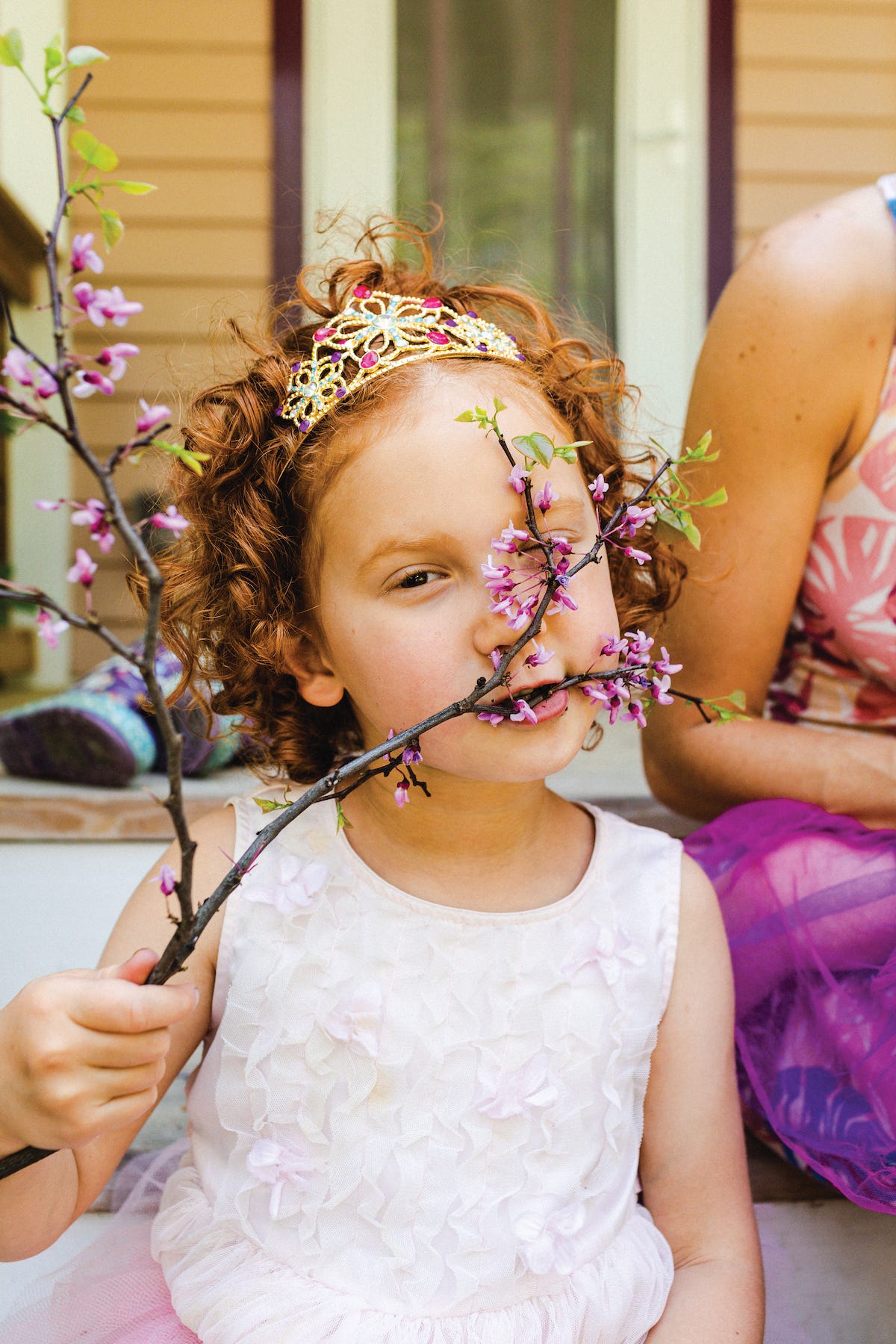
I ultimately landed on the word “caregiver,” after several powerful conversations with my friend Sol, who is trans and nonbinary, and whole-heartedly embodies the caregiving traits traditionally assigned to mothers.
They prompted me to consider whether people who do not identify as “women / mothers” might still express typically perceived “mother qualities,” such as unconditional love, care, and nourishment. For instance, a grandmother who is raising her grandchildren, a father who is the primary caretaker for his kids, a parent who is non-binary, and [insert umpteen other examples here]. And I also considered that some people have had experiences with those who identified as “women/ mothers” who did not provide care.
As someone who has devoutly referred to our planet as Mother Earth and strongly identified with being a mother, this new perspective was groundbreaking for me.
My conversations with Sol allowed me to expand my notion of what “mothering” means in our society, while also giving space to the enormous pressure parents - particularly the parent carrying and/or nursing a child - face in this country.
I’ve continued to reflect on these themes, including through some books and podcasts. Ezra Klein’s recent podcast episode, The Deep Conflict Between Our Work and Parenting Ideals, does an incredible job summing up how structural norms, and workplace and government policies in America put parents at a disadvantage on many levels: financially, socially, emotionally.
In the midst of many challenges faced by those raising children, I find it particularly infuriating to see the way parents - again, particularly the parent carrying and/or nursing their child - have their worries and scarcities taken advantage of by marketing. I feel like a lot of stressed-out parents are targeted by brands that suggest there’s a way to simply purchase more freedom, happiness, and health.
I don’t know about you, but I have tried MANY of these kinds of products and trends to “feel better.” I had chronic fatigue for years, and was ultimately diagnosed with hypothyrodism (very common for postpartum mothers). I have had recurring bouts of anxiety and depression, and often feel weighed down by my stress. I’ve tried to address all of these subtle, yet pervasive, problems with new diets, practices, products and treatments – often those I’ve seen advertised or marketed as perfect solutions to complex issues.

One day at my physician’s office, I asked what she thought about the explosive supplement industry. She said, “I think they’re trying to cure a problem we can’t fix that way.”
What I think my doctor meant, and what I’ve come to realize might be, is that the problem isn’t that we (parents) need more inputs or more to do. The problem is that we need more support, which can allow parents to DO LESS.
I think some of my chronic fatigue, my days of feeling down, and my acute pangs of stress are very much about our social systems that aren't caring for us caregivers. We need changes like better postpartum paid leave policies, free childcare services, and intergenerational and/or community living (like I wrote about in my last newsletter).
BUT, can we implement these things overnight? No.
So what can we do?
One of the absolute simplest ways we can support caregivers is by offering them a meal. In my ever-expanding sister circle, we often organize a “meal train” for friends who have a new baby, are sick, are grieving the loss of a loved one, are recovering from surgery, or simply need extra help. We organize it with the meal train website (this is not an ad!), which makes it easy to volunteer delivering a meal and review the family’s dietary considerations and drop-off times. I’ve also organized meal deliveries through text threads, particularly with out-of-town friends. Often, when meals are delivered, there’s an opportunity to help the recipient by assisting with household chores, holding a baby so the parent can shower or nap, or playing with an older child.
This is just one of many ways we can create informalized systems of care for parents in our community.
So, as we come into this season of nourishment and care *from* our greatest caregiver, Earth, let us find opportunities to expand our view of who can be a caregiver, expand our efforts to care for others while pushing for better systems, and, as I wrote in Seasonal Family Almanac, “tend our communities like gardens, so that together, we can reach our full potential - as Earth intended!”
As you know, one of my favorite ways to show up for others is by offering food, and with "Mother’s Day” around the corner, I want to share a few easy, celebratory ways to honor your mother or “mother” figure in your life. (I also want to acknowledge those grieving the loss of a mother, or unable to celebrate with a mother on this commercial holiday).
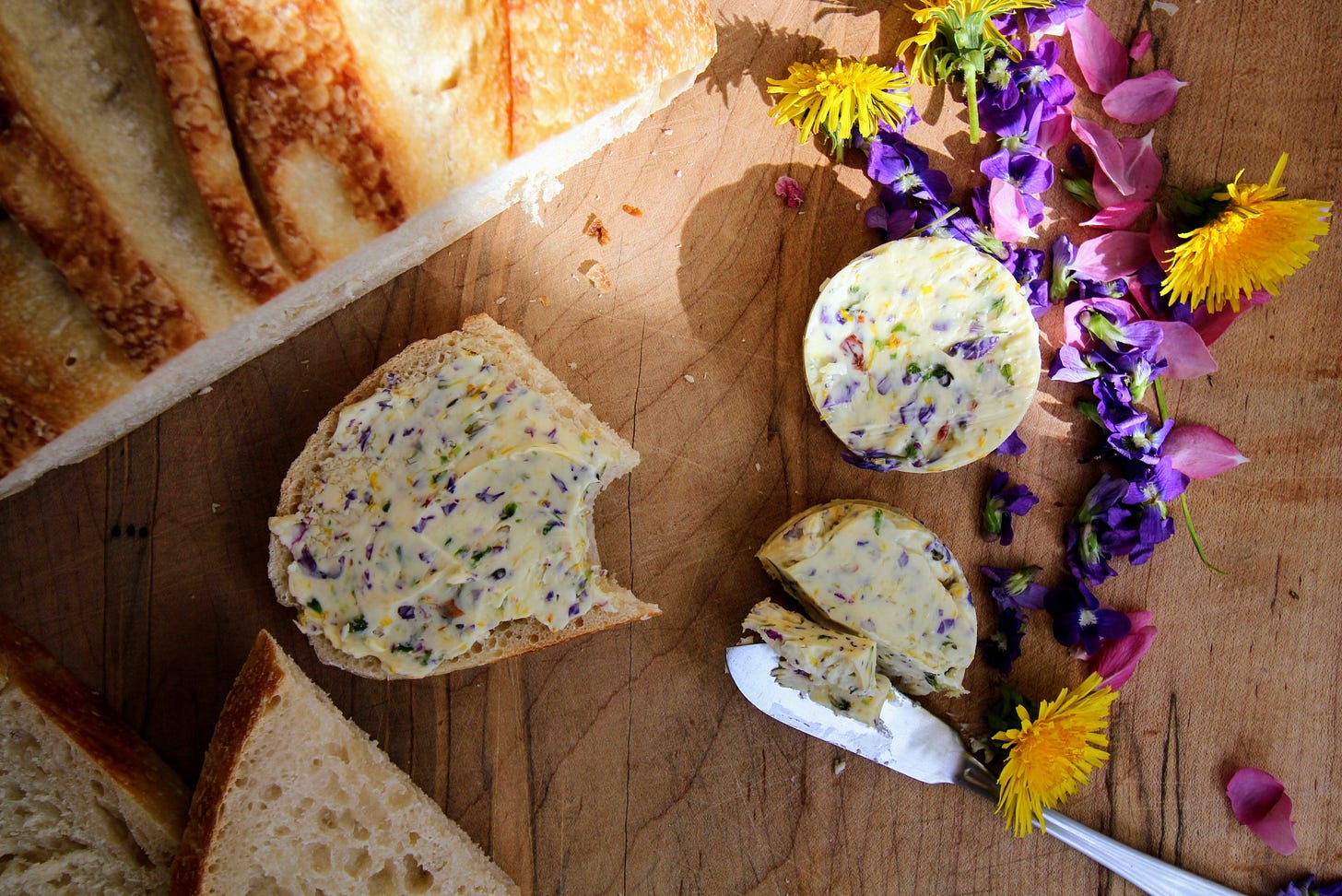
For postpartum mothers, I always make this Nut & Seed Bread, excellent for lactation, recovery, and digestive support, with a seasonal compound butter like this Flower Butter or my friend Sunny’s Ayurvedic Panchakola Ghee.
And there’s always my go-to, Torta di Mandorle, Polenta e Miele, my mother’s recipe for an absolutely divine, simple Almond, Polenta & Honey Cake 🍯🍓 (recipe below).
Edible, wild flowers are bumpin’ right now, and are such a beautiful way to express love.
Without further adieu, the recipe…
♡ Emma
P.S. If any part of this letter resonates with you, I’d love to hear your victories, struggles, and thoughts in the comments below!
Torta di Mandorle, Polenta e Miele (Divine Almond, Polenta & Honey Cake)
Yield: 1 cake ⎹ Prep time: 15 min ⎹ Cook time: 45 min ⎹ Level: Easy
For Mother’s Day, consider making this cake for your mother or another “mother” in your life. My mother introduced this recipe to me when she was keeping bees and using their honey gifts. The beauty of this simple cake is that it can be adapted to any season. The cake itself is moist and dense, without being heavy. It’s gluten-free and packed with protein. The simple honey-fruit topping can be made with whatever fruit is in season or available to you, lending to endless variations of the same base recipe. In this recipe, I made a honey-lemon-strawberry topping with wild violets (here’s a primer on these edible flowers). I have a recipe on my blog for a honey-cherry-rosemary topping. Eat this for breakfast, dessert, or whenever you damn well please!
Cake:
1 cup unsalted butter, softened at room temperature
3/4 cup cane sugar or light brown sugar
3 Tbsp honey
2 cups almond flour
1 1/4 cups fine polenta or cornmeal cornmeal
1 tsp baking powder
3 large eggs, beaten
Topping:
1/4 cup honey
About 1 quart strawberries, stemmed and halved
Zest of 1 lemon
Juice of 1/2 lemon (optional)
Violets or other edible flowers, for garnish
Instructions:
Preheat the oven to 350. Line the bottom of a spring form cake pan with parchment paper, trimming the edges to prevent the paper from burning in the oven. Grease the sides of the pan.
In a stand mixer with a paddle attachment, beat the butter and sugar until light and fluffy. large bowl (you can also use a fork to beat the ingredients in a bowl).
Add the honey and continue to beat until the mixture pales in color.
In a separate large bowl, add the almond flour, polenta, and baking powder, and mix with a fork.
Add half the dry mixture and half the beaten eggs to the butter mixture, beating or stirring to incorporate. Once incorporated add the rest of the dry mixture and eggs, mixing together thoroughly until you have a thick, smoothly blended batter.
Pour the batter into the prepared cake pan and evenly spread the surface of the cake with a spatula.
Bake for 30 minutes on the middle rack. After 30 minutes, reduce the temperature to 325. If the top of the cake is browning quickly, cover it with foil. Continue baking the cake for about 15 minutes, or until a toothpick inserted in the center comes out clean. Transfer to a wire rack to cool inside the pan.
While the cake is baking, prepare the topping: Add the strawberries to a medium saucepan with a few tablespoons of water. Bring to a boil and immediately reduce to a simmer, stirring occasionally until the strawberries are softened and have rreleased juice. Add the honey, lemon zest, and lemon juice, if using, and continue to simmer until the juice thickens slightly. Remove from the heat and set aside. the rosemary dd and the cherries in a small saucepan and bring to a boil.
Remove the cake from the springform pan and transfer to a serving plate. You can slide it off the parchment paper, or leave it beneath. Prick the surface of the cake with the toothpick or a fork. Pour the warm topping over top, allowing it to absorb into the cake. Garnish with edible flowers.
Devour warm or cold. Store leftovers in the refrigerator, covered.
Want more recipes?
"Be in family with each other--offer the love and care we can, receive the love and care we need...Let our lives be a practice ground where we're learning to generate the abundance of love and care we, as a species, are longing for."
adrienne marie brown. 2019. Pleasure Activism: The Politics of Feeling Good. AK Press.

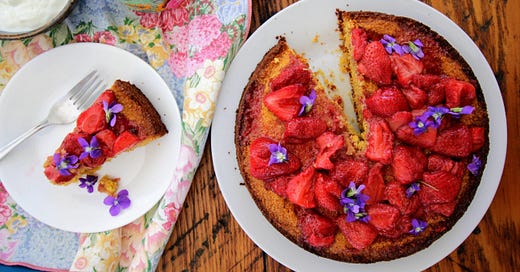





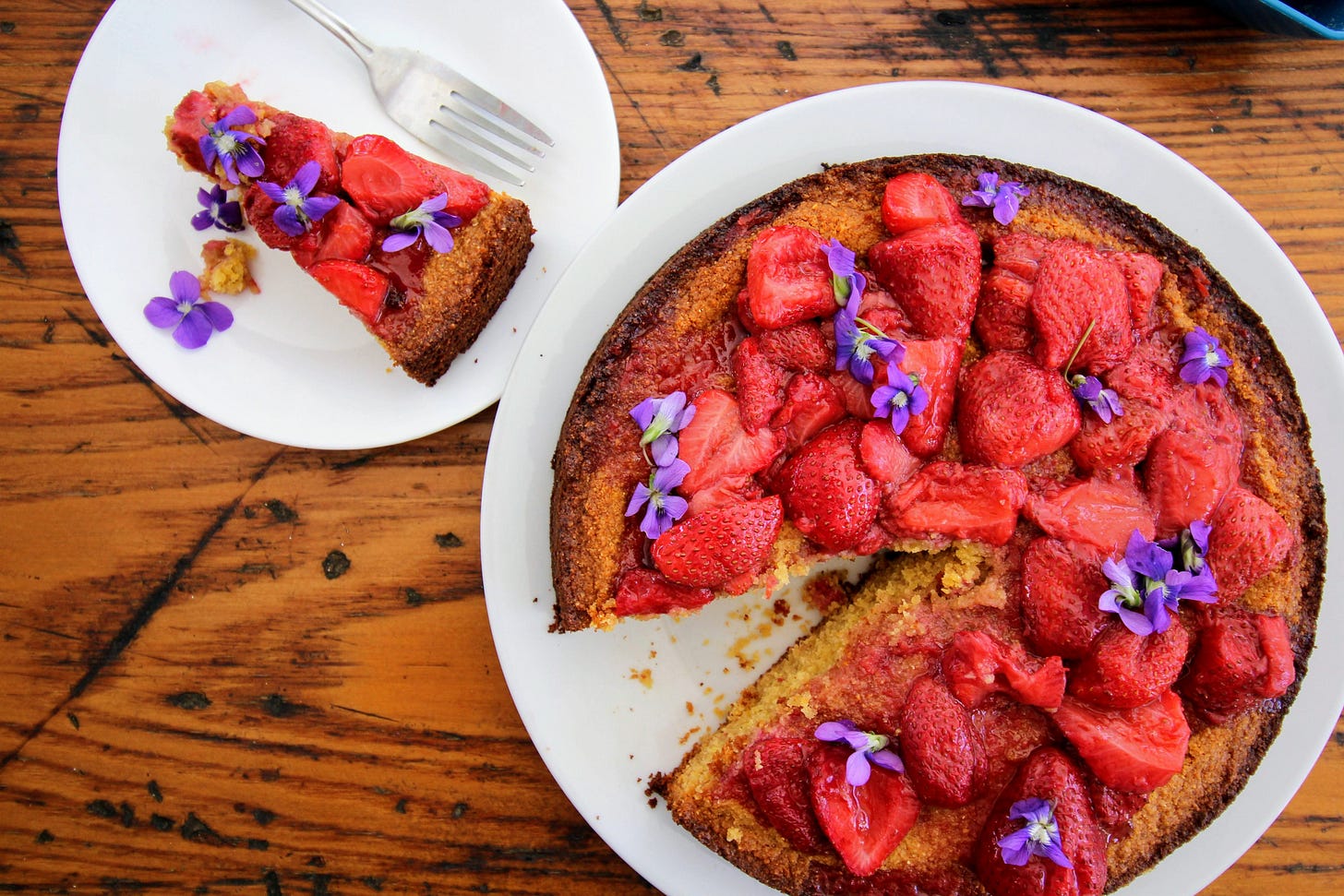
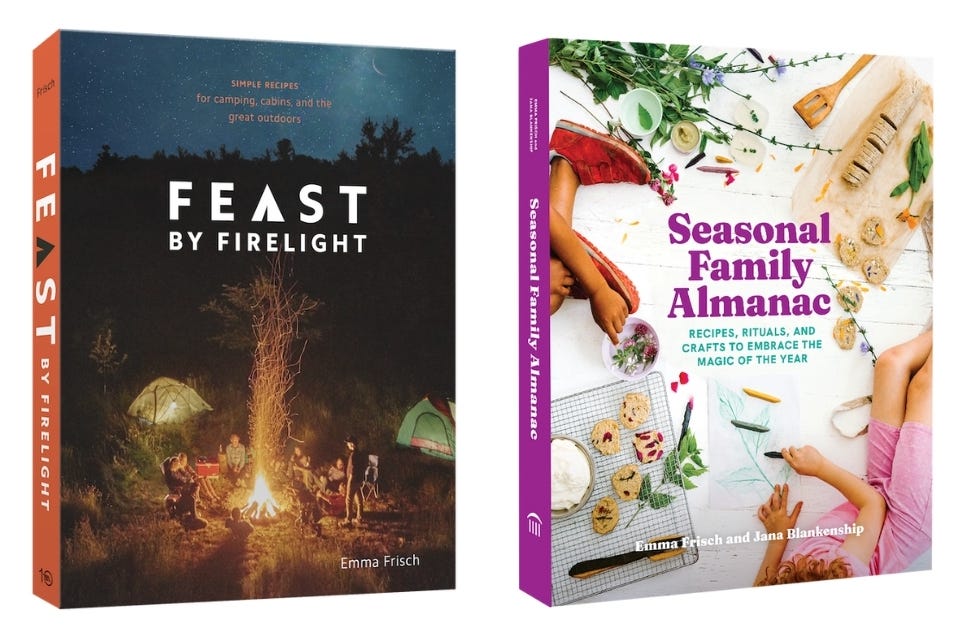
I love that you hit on non-binary and men as "mothers." There are multiple studies that show that when men are primary caregivers, they become more nurturing - both in behavior and in their brains.